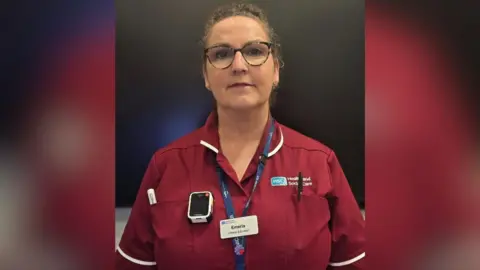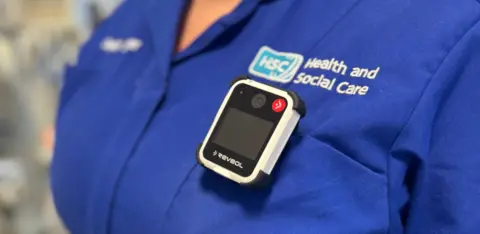 BBC
BBCA nurse with 25 years of experience has said wearing a body camera has made her feel safer because of a “massive increase in violence and aggression” towards healthcare workers.
Emeria Doherty works in the Emergency Department at Antrim Area Hospital and is part of a body camera pilot scheme.
She said patients were “throwing anything they could get their hands on” at nurses and she had seen some with knives.
The most recent figures show that in four years – between 2019/20 to 2023/24 – there were almost 56,000 recorded instances of physical abuse towards healthcare staff across Northern Ireland’s six trusts.
Ms Doherty added that nurses were finding it difficult to cope with the violence.
“We have a lot of staff that have had to go off with long-term sickness because of violence and aggression,” she said.
“We don’t want that, so we are very happy wearing these body-worn cameras for our safety and for the safety of patients.”
 Northern Trust
Northern TrustThe most recent figures also show there were almost 13,000 instances of verbal abuse towards staff between 2019/20 to 2023/24.
There were almost 10,000 recorded instances of verbal or physical abuse directed towards staff in the Northern Trust – which runs Antrim Area Hospital – over that period.
The pilot began at Antrim Area on 1 September and will run for 12 weeks.
The cameras will not run constantly but will be turned on when an incident arises with a warning issued to patients beforehand.

“Our job is to de-escalate a situation. If we can’t de-escalate that situation, then we let people know that we are switching the camera on,” Ms Doherty said.
Wearing body cameras had already reduced violence against staff members, she added.
“It’s a sad day. And I never dreamt that it would ever come to this, but I think it needs to be the norm,” she added.
Executive director of nursing Suzanne Pullins said attacks “did not happen every day”, but when they do it was “quite emotionally disturbing for staff”.
“We never anticipated that we would be in this position of having to implement body-worn cameras,” she said.
“People who come to use our services are vulnerable. They’re not well. They don’t wish to be exposed to violence and aggression whilst they wait for their treatment or assessment.
“That’s really key for us to consider at the end of this pilot and to really work out the strategy for our organisation.”
Do other trusts use body cameras?
The Northern Trust is the first regional health trust to pilot the use of body-worn cameras for healthcare staff.
Some emergency healthcare workers, such as paramedics, already have access to body-worn cameras when attending calls.
In 2022 the Southern Trust trialled body-worn cameras at Craigavon Area and Daisy Hill hospitals for its security team.
Police officers also use similar devices, both for transparency and as an evidence gathering tool.
The Belfast Trust recorded more than 22,000 instances of physical abuse towards staff between 2019/20 to 2023/24 – significantly higher than any other trust.
A spokesperson for the trust said it was considering whether to introduce a similar pilot scheme for staff to wear body cameras.
The South Eastern Trust said it currently did not have any plans to introduce body-worn cameras for staff within the Emergency Department.
It said it would continue to “monitor progress across the region to determine the effectiveness of the pilot scheme”.

